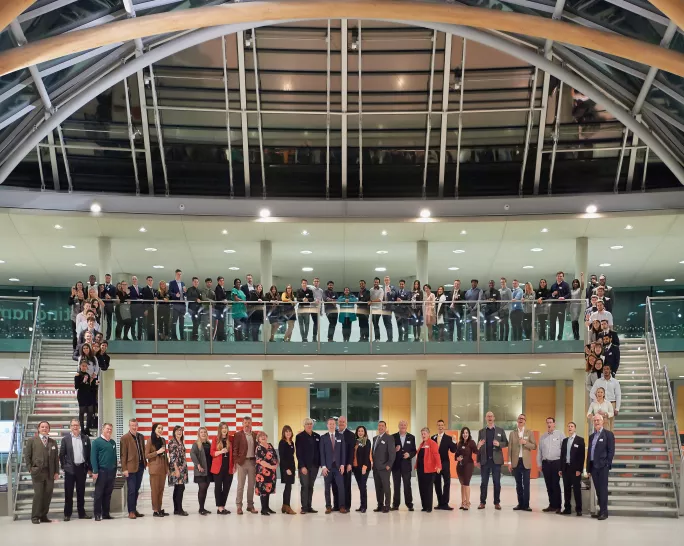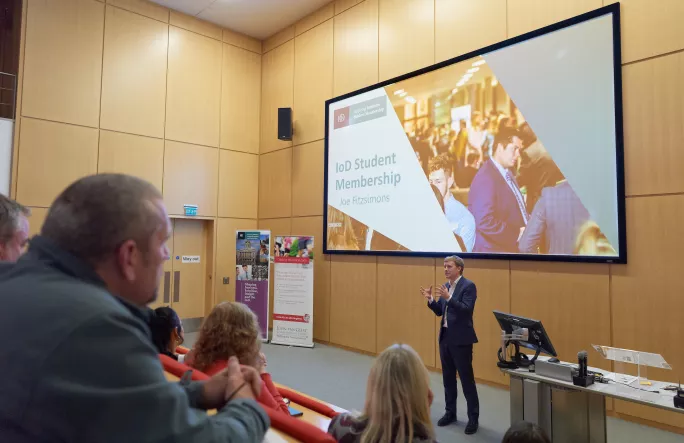- Home
- Meet the man bringing education and employers together
Meet the man bringing education and employers together

It was when he was in primary school that Joe Fitzsimons first discovered the opportunities that a career in business could offer.
His school in County Meath, Ireland, invited different speakers to give careers talks and when figures from the world of business came to speak about the innovative activities they were taking part in and the countries around the world they were visiting, a young Fitzsimons was inspired.
And so, from the age of 11, he began building towards a career in business. Today, he is head of education and skills policy at the Institute of Directors (IoD): a role that sees him work hand-in-hand with both business and education leaders to close the skills gaps and ensure that students are work-ready when they enter the workplace.
News: ONS says fewer young people not in education or training
Coronavirus: What next for apprenticeships?
T levels: Third of providers ‘not ready for placements’
A budding businessman
Fitzsimons was born in the US and moved back to Ireland with his parents when he was a baby. He says he was very entrepreneurial as a child and influenced by the guest speakers from his primary school - neither his parents nor family had careers in business - he started his first job in a corner shop aged 11.
Working at the shop from such a young age helped him to understand the commitment that business owners have to their customers, the importance of providing a good-value service, and the extreme hard work it takes to keep a business running.
Aged 17, Fitzsimons left his big family behind - he’s one of six children - and moved to London to study business studies at London South Bank University. It was a big change, he says, and it took a while to adjust to living and studying in such a big city.
Throughout his degree, Fitzsimons made the most of every activity and every opportunity on offer. He became a student ambassador for the university, travelled to Ottawa, Canada, to take part in international business competitions and, in his second year, became a student member at the Institute for Directors.
“The university really went above and beyond to create these opportunities, and to partner with other organisations to give as much value to students as they possibly could. There were just so many activities that really add a huge value and you develop such practical skills through them,” he says.
“I could see my own development. When I started at 17, I was considerably shyer and quieter. But by the time I completed many of these activities, it really helped to develop the skills and the working behaviours that I could use then later on as I graduated looked to the future of my own career and development.”
Facilitating opportunities for the future workforce
As a student member at the IoD, Fitzsimons says he networked as much as he possibly could, attending every seminar, every event, every skills-based session, understanding the value in building those connections and being inspired by others’ journeys - just as he was aged 11, back in his primary school in Ireland.
Fitzsimons formed a committee of students at LSBU who would, in turn, host their own events and invite speakers in.
“It was a really nice way to allow others to benefit from hearing from people in the world of business, and on the ground. Learn more about what challenges they’re facing, learn more about how the business environment was changing. And I really absolutely loved the whole experience,” he says.

And so, when the IoD was advertising for a role in the student membership department as Fitzsimons was graduating, he jumped at the chance to work full time at the institute. Despite his experience organising and attending events and growing his own network, he says it was a huge learning curve.
He threw himself in facilitating events that enabled students to develop their workplace skills while at university and to give them that competitive edge once they entered the job market. After a year, he was promoted to lead the membership department. In that role, he worked with 20 universities around the UK and grew the community of student members to more than 2,000. He talks of one particularly memorable event in which students at Nottingham Trent University were given £10 in groups of five, assigned a business mentor and told to grow that £10 into as much money as they could through entrepreneurial activity. In a few years, “the £10 Challenge” raised more than £50,000 for a cancer research centre in Nottingham.
From manager to apprentice
It was during that time that Fitzsimons decided he wanted to develop his own skillset further - and applied to do a masters-level apprenticeship in senior leadership at Nottingham Trent University.
“I was really interested in apprenticeships and it was something that I discussed with many universities and our members: many were benefiting from having apprentices as part of their organisations,” he says.
“It was a really fantastic opportunity and helped me to grow and develop myself and better understand how apprenticeships work, from a learner perspective.”
During that apprenticeship, Fitzsimons spent some time at Stellenbosch University in South Africa working with start-up businesses there, as well as consulting for a not-for-profit gym running in Nottingham city centre. He recently completed the apprenticeship - and says he is disappointed it’s over.
As well as making close contacts with others on the programme, the apprenticeship also meant he developed a “really keen interest” in the policy work at the IoD.
“I had benefited personally so much from the opportunity to study at university, the opportunity to undertake an apprenticeship, and the opportunities within both to participate in extracurricular activities and build social capital through meeting others on the programmes and at the institutions and so on,” he says.
“I really wanted to be able to promote the highest standards possible in education and skills, and from speaking to members over the years, I’ve been at the institute five years old together now, they’ve always highlighted to me the various skills gaps that exist around leadership and management, and the challenges they face as organisations when it comes to higher technical skills, and work readiness.”
Building bridges between education and business
Luckily for Fitzsimons, a role was introduced at the IoD that would enable him to use the experience he’d gained through all these activities today to benefit the members and the sector in general: that of head of education and skills policy.
It’s a brand new role, introduced to recognise the growing collaboration between post-16 education and employers when it comes to designing and delivering qualifications. Fitzsimons, like many other leaders who started new roles just before, or during the Coronavirus pandemic, says it’s been a challenging time.
The IoD’s members have suffered massively, he says, and he is constantly in contact with business leaders to understand what their priorities and challenges are. When it comes to routes from education through to the workplace, there’s a lot for business to get their heads around, he says.
“There are so many new qualifications for members to come to terms with, you have T levels, FE, HE, apprenticeships: really quite a lot of different programmes to get to grips with and to fully understand where they all sit and how they all interact with one another,” he says.
“A big part of our work at the moment is in communicating the overall picture to members and understanding where the gaps still may sit and try to work with them to bridge those gaps where we can, but it’s a really interesting time for the sector.”

Fitzsimons says the IoD surveyed members last summer to see if they’d be happy to welcome a young person into the workplace for the T-level industry placement. At that time, he says, members were really positive. However, times have changed, and at the moment, placements - and indeed recruitment of apprentices - is not a priority for many businesses.
“Many organisations would also say they’re very much in survival mode at the moment so although apprenticeship incentives are very much welcome, it may be the case that members have other priorities ahead of looking at recruiting other members of staff,” he says.
“In light of the current situation, there are so many competing priorities. It may be that they need to look further into the future to engage by bringing some of those individuals on board. It is just that concern around bandwidth just now, and how the organisation is looking as a whole.”
However, he does say that employers “absolutely recognise” the value of young people being able to learn and work at the same time - he says that why so many have such a positive experience with apprentices.
Fitzsimons says that employers do want to see change in apprenticeships: particularly around the off-the-job training element.
“While the learning component is highly valuable, anywhere where additional flexibility can be given around the schedule of how that looks in terms of timeframes or the way that it works whether you know virtual more virtual off the job training is possible. All of these kinds of innovations will really help to support members as they look to develop the workforce for the future to be fit and ready for the workplace,” he says.
Earlier this summer, education secretary Gavin Williamson spoke about the role further education has to play in developing young people into work-ready employees. Fitzsimons says “there’s a range of views” on whether or not education from an FE college is equal to that of a university.
“There’s certainly a range of views amongst our members on this, and undoubtedly members recognise the value of college qualifications and university qualifications. They’re really keen to engage to ensure that the skills and the knowledge that the students are developing through both routes are making them work-ready,” he says.
“One of the challenges is that students have the knowledge, and they’ve undertaken fantastic courses of study that have been delivered to a very high standard, but often the practical skills that the students tend to learn on the job is what many miss out on. Members are keen to support with bringing students to organisations for that type of practical work-based experience, alongside their studies so that they are ready for the world of work when they graduate.”
Fitzsimons says that he thoroughly enjoys his work - and that it’s really fulfilling to have a positive impact on the future of young people and to drive forward the agenda that develops the skills that young people need to be successful.
“I’m really keen to continue driving forward the education and skills agenda, working with the business community and educational institutions to bring groups together for mutual benefit to fully understand what needs to be done and to support with making that happen,” he says.
“I’m very excited about the future of the skills and education agenda.”
Keep reading for just £1 per month
You've reached your limit of free articles this month. Subscribe for £1 per month for three months and get:
- Unlimited access to all Tes magazine content
- Exclusive subscriber-only stories
- Award-winning email newsletters



